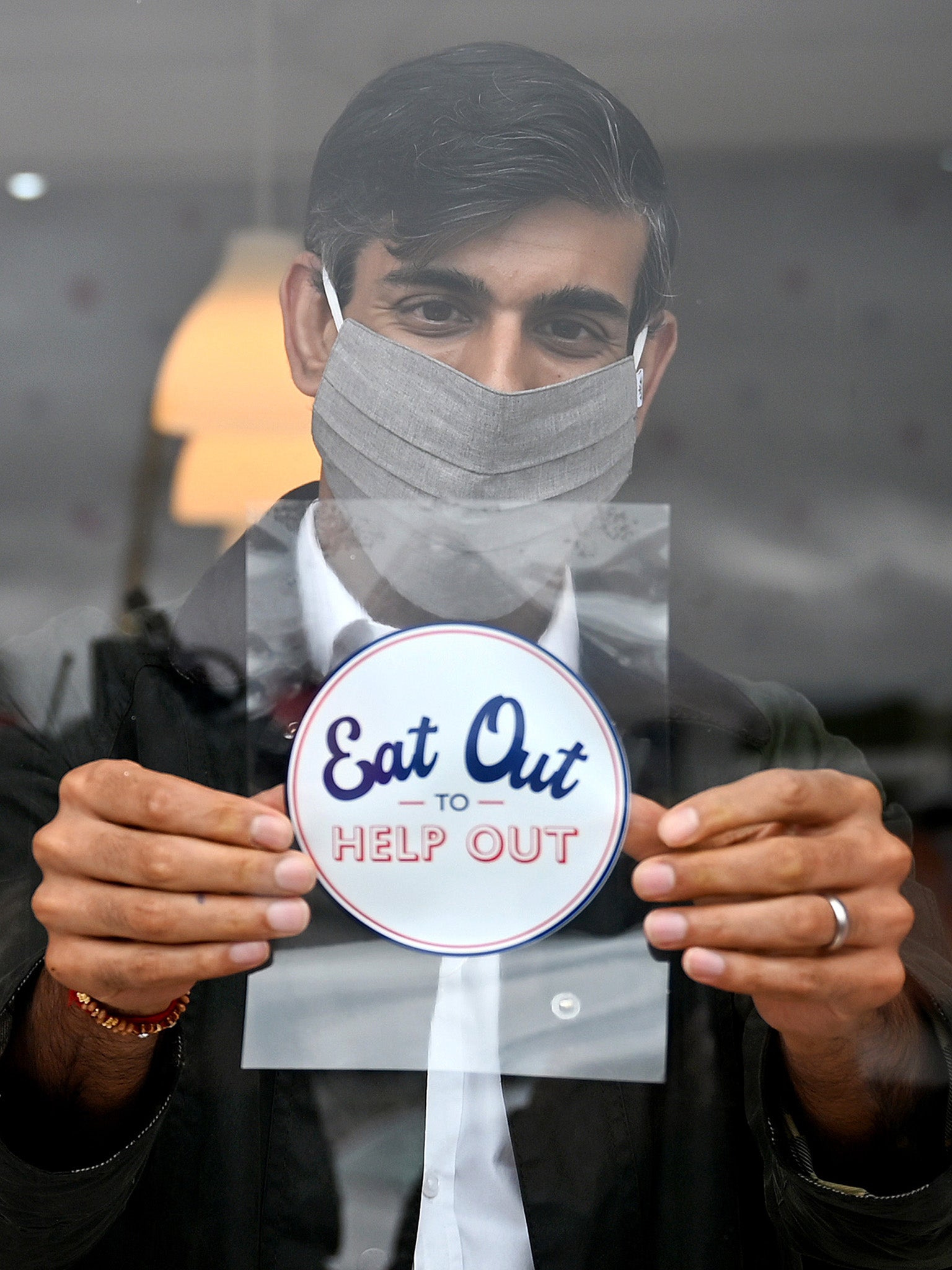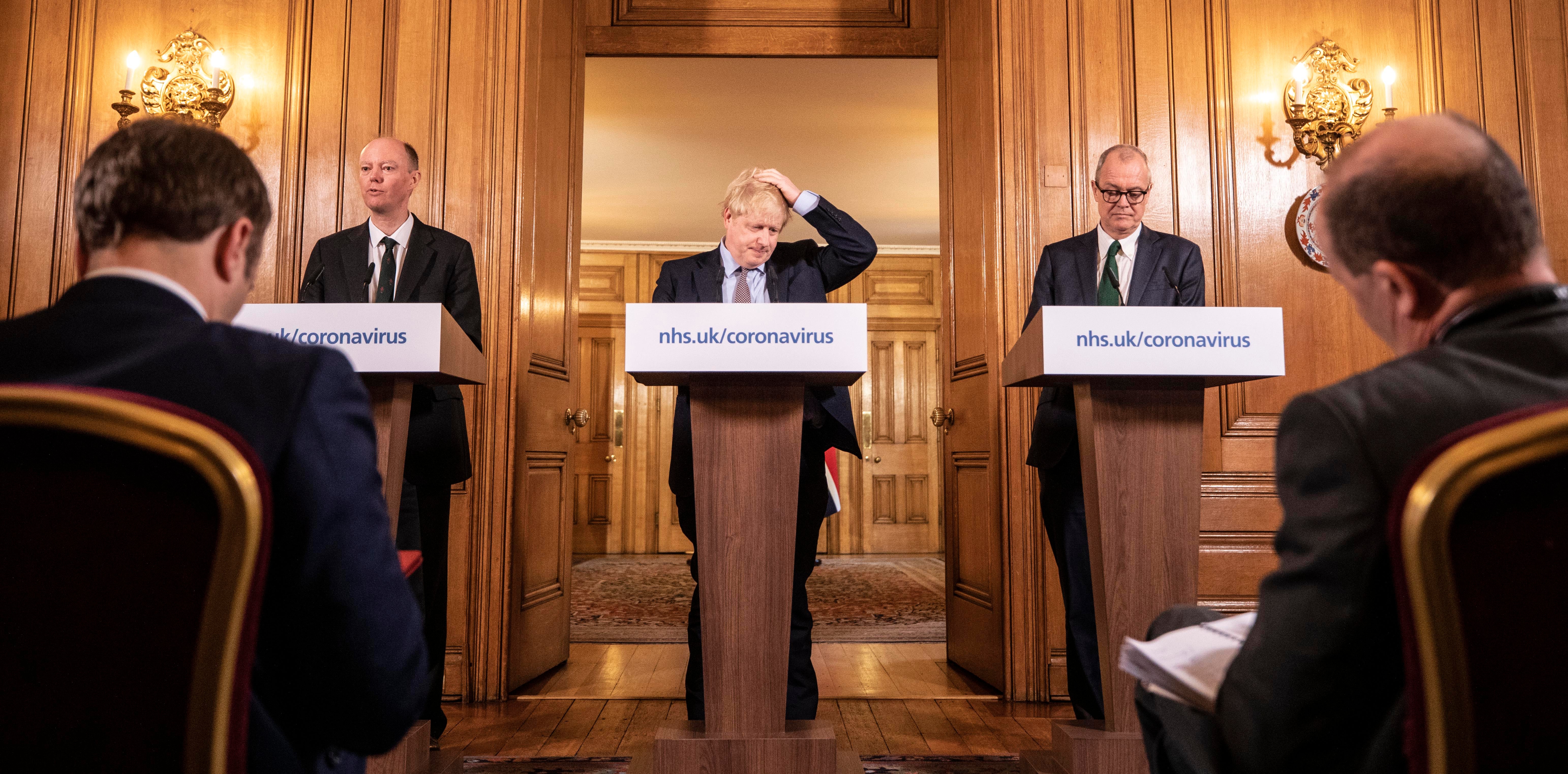Next slide please: The pandemic phrases we’ve grown to love (and hate) over the past year
As we mark a year since the national lockdown was first announced, Sean O’Grady takes a look at some of the words and phrases that have been coined or made a resurgence in the past 12 months


It’s been a year, one where so much has changed, and all too often for the worse. Even the language we use has been infected, to the point now where a stressful day spent Zooming, WFH and trying to placate bored kids can be enlivened by playing a game of Covid bingo. See how many of these now-familiar words and unprecedentedly common, indeed viral, phrases you encounter as you try to adapt to the new normal...
Unprecedented. Rightly this was the Oxford English Dictionary word of the year for 2020, because everything was, is, and will be unprecedented as a result of the pandemic. Obviously.
Alas. This slightly archaic expression soon became a prime ministerial favourite as Boris Johnson delivered yet another disappointing piece of news about lockdowns, infections, and fatalities. It duly caught on among Conservative MPs, and in November 2020 the word was used some 80 times in the House of Commons, the most in two centuries of Hansard records. Johnson hasn’t yet found a way of weaving in a reference to knowing Yorick, but it can only be a matter of time before a whips a skull out at PMQs.
“What any father would do” (and variations). An all-purpose excuse for busting lockdown rules, notably deployed by Dominic Cummings and Ted Cruz. In itself it sounds morally unchallengeable, whereas in reality most fathers don’t find any compelling need to drive to Castle Barnard or holiday in Cancun because neither was necessary.

“Next slide please”. The catchphrase of pandemic hero Chris Whitty, chief medical officer, and his expert colleagues at the press conferences. Alas, the slides were usually unrelentingly miserable and looked like they were designed to out the fear of God into everyone. Which was just as well, really.
Covidiots. Selfish members of the public prepared to put their own and others’ lives at risk because of their devotion to pseudo-science and insane conspiracy theories about 5G, and George Soros and Bill Gates wanting to exercise mind control; or free citizens thinking for themselves and defending liberties granted by Magna Carta. Did she die in vain? You choose.
WFH. Working from home proved a mixed blessing for some, perhaps tilting the “work-life balance” just a little too far towards childcare and domestic responsibilities, especially while the schools were shut.
Read more:
“Stay Home. Protect the NHS. Save Lives”. Like “Careless Talk Costs Lives” and “Dig for Victory” from the last world war, the first and most effective of the official three-part slogans for the present war on Covid has an almost nostalgic feel to it, recalling a time when the nation was unexpectedly united and everyone knew exactly what to do. They did, too. It ended in tiers, as we know.

“Eat Out to Help Out”. Now associated with a spike in the number of cases after a premature relaxation of lockdown last autumn, it was the Treasury’s way of popularising a jolly scheme to buy burger and chips for every peckish Briton. The proposal was such poor value for taxpayers that civil servants insisted on a direct order from Rishi Sunak to implement it. Not his finest hour.
Read more: How much did Eat Out to Help Out really help the UK economy?
“Every one of those deaths is a tragedy”. Routine words tacked on without feeling by the politicians every time they had to read out yet another morbid Covid statistic. Overuse tended to lessen the impact.
“Flatten the sombrero”. Another memorable coinage by our journalist-turned-prime-minister. He meant that the prospective peak in Covid cases threatened to overwhelm the NHS, so the idea of lockdown was to spread the arrival of sick people at the hospitals to avoid that dreadful eventuality. It sounded slightly in poor taste, though, a little flippant in the face of a terrifying pandemic, unprecedented in a century.
“Operation last gasp”. Yes, another Johnsonism, reportedly uttered in a meeting with officials despetely trying to locate ventilators for patients fighting for air. Rarely heard now, but occasionally quoted by the Conservatives’ political opponents.

“Don’t kill gran”. Mike Hancock’s contribution to the thesaurus, born out of frustration with sentimentalised nonsense about “saving Christmas” and demanding that elderly frail relatives be given a hug by some Covid-ridden asymptomatic toddler, with the entirely predictable result at gran would end up, in intensive care about ten days after and the morgue shortly thereafter. Brutal truth, and effective.
“Clap for carers”. Every Thursday at 8pm there was a mass noise to show how grateful the British people were to the NHS and care “front one” workers who were working so hard to protect everyone. All agreed that such unprecedented dedication to duty would be followed an an unprecedented and more tangible gesture of gratitude. It didn’t quite turn out like that, as some “NHS heroes” (qv) were perceptive enough to foresee.

“We will meet again”. One of the very few times when the struggles and spirit of the second world war was invoked, and by someone who was around at that time. The Queen’s message was made the more poignant by the passing of Dame Vera Lynn during the pandemic.
“Tomorrow will be a good day”. Captain Sir Tom Moore’s odyssey around his garden in his walker was inspiring, and Britain went a bit bonkers about him. He raised £400 million, and made it to 100 and national treasure status before he succumbed to Covid.
“Follow the science” (and variations). Defined simply as what politicians say they do, even when they don’t, because no-one can prove otherwise. A handy alibi to use when things go wrong and they can blame the scientists.
“NHS Heroes”. Until they ask for a pay rise, adequate equipment or more staffing.
Read more: Is the UK ready for the next pandemic?
“Variant of concern”. A suitably sci fi sounding expression for the coronavirus’ mutations. Sooner or later there’ll be one that beats the vaccines. That’s concerning.
“World leading/beating”. Used to be attached to the words “app”, “test and trace system” and “moo short” but virtually unheard these days - except when applied to the Covid vaccines and their roll-out, which actually lived up to the billing.
PPE. Used to refer to the not-that-difficult Oxford degree of choice for elite politicians, and latterly to the failure of the same political classes to find enough masks and gloves to protect “NHS heroes” (qv) from serious illness.
“The New Normal”. It isn’t.
Zoom. (Also Zooming, Zoombombing). How we waste time nowadays, ie remotely rather than doing so together in the same room. The productive potential of the new technologies was showcased by the famous “talking cat of Texas”, and by Handforth Parish Council, whose proceedings went viral and spawned countless memes and yet more Covid catchphrases - “You have no authority here Jackie Weaver, no authority at all!"; "Read the standing orders! READ THEM AND UNDERSTAND THEM!!"; and of course Ms Weaver’s request: “Please refer to me as Britney Spears from now on.” Unprecedented stuff.
Join our commenting forum
Join thought-provoking conversations, follow other Independent readers and see their replies
Comments